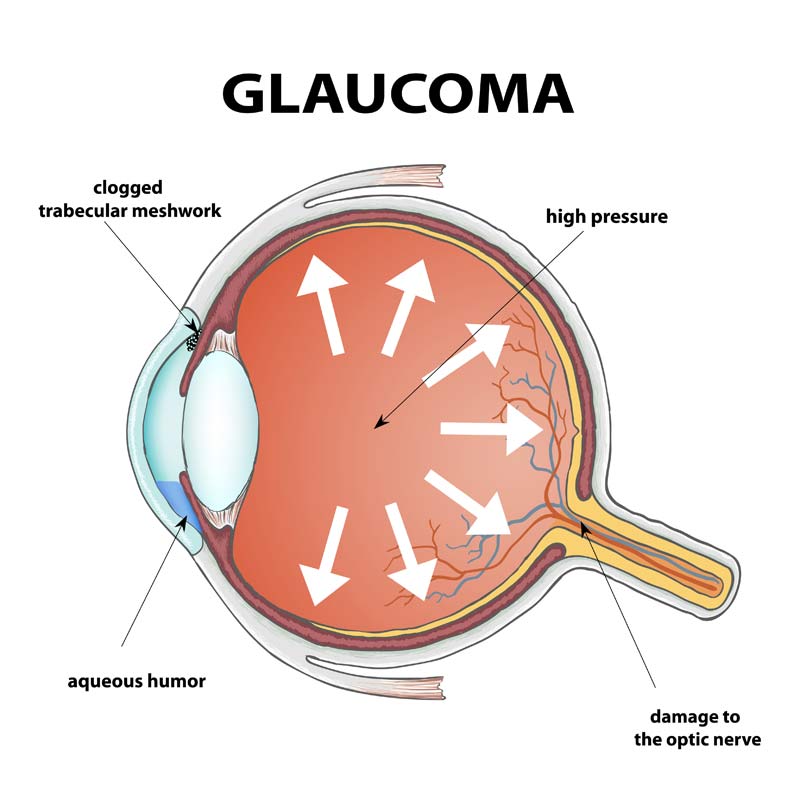Glaucoma
Glaucoma Diagnosis and Co-Management
What is Glaucoma?
The optic nerve is a bundle of millions of nerve fibers which relay visual signals from your eyes to your brain. Glaucoma is a group of eye conditions related to abnormally high pressure in the eye which cause progressive damage to the optic nerve. Vision loss and even blindness can result from the damage to the optic nerve. Glaucoma is one of the leading causes of blindness.

Types of Glaucoma
Glaucoma which isn’t caused by another medical condition is called primary glaucoma, and there are four types.
Open-angle glaucoma
Open-angle glaucoma is the most common type of glaucoma in the United States. Most people don’t experience any symptoms of open-angle glaucoma until they experience some vision loss, and this vision loss may not be noticed at first. The cause of open-angle glaucoma isn’t certain; however, it is believed to be associated with a build up of pressure in the eye due to fluids not draining properly from the eye, and this pressure damages the optic nerve. The only way you’ll know if you have open-angle glaucoma in its early stages before vision loss occurs is through a comprehensive eye exam.
Normal-tension glaucoma
Normal-tension glaucoma occurs when there is damage to the optic nerve, but the pressure in the eyes is normal.
Angle-closure (acute) glaucoma
Angle-closure (acute) glaucoma occurs when there is a sudden blockage of fluids in the eye which causes a severe and painful increase in the pressure in the eye. Angle-closure glaucoma is an eye emergency. Symptoms of angle-closure glaucoma include nausea, severe eye pain, and blurred vision.
Congenital glaucoma
Congenital glaucoma happens when people are born with a defect in the angle of their eye which slows or prevents the drainage of eye fluids. Symptoms can include excessive tearing, eye cloudiness, and sensitivity to light. This type of glaucoma can be hereditary.
Glaucoma which is caused by another medical condition, such as diabetes, cataracts, or eye tumors, is called secondary glaucoma.
What are the Symptoms of Glaucoma?
The most common type of glaucoma is open-angle glaucoma, and because the buildup of pressure from fluid in the eye is so gradual with this type of glaucoma, there is usually no pain or discomfort in the early stages. Even the vision loss from this type of glaucoma may not be noticed at first, because it affects the side (peripheral) vision before it impacts the central vision. For this reason, glaucoma is often referred to as “the silent thief of sight”. In less common forms of glaucoma, symptoms can include hazy vision, nausea or vomiting, and eye or head pain.
Who is at Risk for Glaucoma?
Glaucoma can affect people of all ages, but certain groups of people are at higher risk of developing it.
Eye Problems: Trauma to the eye from injury can cause the pressure in the eye to increase, which leads to greater risk of developing glaucoma. Chronic inflammation of the eyes and thin corneas can also lead to an increase in pressure in the eyes.
Family History: Some types of glaucoma are hereditary, so people who have a family history of glaucoma are at higher risk of developing it. If your parent or grandparent had the most common form of glaucoma, open-angle glaucoma, then you have a greater chance of developing it, too.
Medical History: People who have diabetes, high blood pressure, cataracts, eye tumors, and heart disease are at risk for developing secondary glaucoma.
Age: People who are over the age of sixty have a higher risk of developing glaucoma.
Use of Certain Medications: People who have been on corticosteroids for an extended period have an increased risk of developing glaucoma.
Ethnicity: People of African, Asian, or Hispanic descent are at greater risk to develop glaucoma.
Glaucoma Diagnosis in Tinley Park
The expert doctors at Walter Eye Clinic have advanced technology and years of expertise in the diagnosis of glaucoma. There aren’t any obvious symptoms in the most common type of glaucoma, and by the time vision loss is noticeable, the disease is in an advanced stage. Fortunately, early diagnosis and treatment can minimize or prevent further damage the optic nerve and limit glaucoma-related vision loss. The best way to diagnose glaucoma in the early stages is to come in for regular comprehensive eye exams.
Treatment for Glaucoma
There are different ways how to treat glaucoma depending on the type and severity of the disease. If you are diagnosed with glaucoma, our doctors will work with you on the next best steps and determine the best glaucoma management plan for you.
Glaucoma treatment and management may include:
- Prescription eye drops
- Medicine
- Surgery
Managing glaucoma can be involved and may require working with an ophthalmologist as well. If necessary, we will refer you to an ophthalmologist in the area and work together to create a glaucoma treatment plan that best meets your needs.
Do not wait until serious damage is already done. Make your appointment today and get checked for glaucoma at Walter Eye Clinic.
